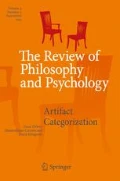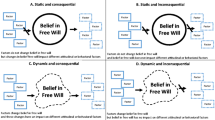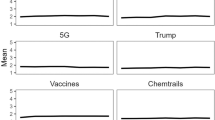Abstract
Previous research associates free will skepticism with adverse well-being effects. However, it is doubtful that skeptical participants in these studies disbelieved in the incompatibilist notion of what it means to have free will. This is one of the first studies to exclusively examine such skeptics. A sample of 167 participants who claimed to believe that there is no free will responded to an online survey. After examining whether participants in fact disbelieved in the incompatibilist concept, they were asked to describe how their skepticism is affecting their personal life and well-being. Reoccurring themes were identified through thematic analysis. Positive consequences were most commonly reported, including increased compassion for others and oneself, being less controlling and more relaxed, as well as having more control through environmental awareness. Other participants felt unaffected by their disbelief and most frequently mentioned the persisting feeling of having free will as a reason. The most common negative implications were to feel less effective as an agent and to miss a sense of purpose. These findings may shed new light on how to handle the issue of free will in the public sphere as well as inform future research investigating incompatibilist free will skepticism.
Similar content being viewed by others
Notes
Although philosophers may disagree about the difference and significance of defining free will as alternative possibilities or ultimate sourcehood, this text assumes that both result in the same incompatibilist notion.
Some studies indicate that the exposure to anti-free will messages leads to anti-social behaviour like increased cheating, aggression, or selfishness (Baumeister, Masicampo, & DeWall, 2009; Vohs & Schooler, 2008; Protzko, Ouimette, & Schooler, 2016). However, conflicting research also finds pro-social effects or no effect at all (Caspar, Vuillaume, Magalhães De Saldanha da Gama, & Cleeremans, 2017; Earp et al. 2018; Crone & Levy, 2019; Monroe, Brady, & Malle, 2017).
People’s degree of belief in this compatibilist ability may not be of much philosophical interest. It is relatively uncontroversial to claim that people have some capacity to make choices based on conscious deliberation.
It seems unsurprising that such a belief is associated with adverse well-being effects.
If these manipulations convinced people to disbelieve in the incompatibilist notion, the illustrative capacity of their immediate reactions would also be questionable.
Excerpts used in manipulations usually deny free will in the incompatibilist sense and do not claim that people’s desires are less consequential (e.g., Crick, 1994). It can, therefore, be argued that participants initially misunderstand these authors (Nahmias, 2011).
References
Bargh, J. A. 2008. Free will is un-natural. Are We Free, 128–154.
Baumeister, R. F., E. J. Masicampo, and C. N. DeWall. 2009. Prosocial benefits of feeling free: disbelief in free will increases aggression and reduces helpfulness. Personality and Social Psychology Bulletin 35 (2): 260–268.
Bergner, R. M., and A. Ramon. 2013. Some implications of beliefs in altruism, free will, and nonreductionism. The Journal of Social Psychology 153 (5): 598–618.
Blackmore, S., and E. T. Troscianko. 2018. Consciousness: an introduction. Routledge.
Blackmore, S. J. 2006. Conversations on consciousness. Oxford University Press.
Bono, G., M. E. McCullough, and L. M. Root. 2008. Forgiveness, feeling connected to others, and well-being: two longitudinal studies. Personality and Social Psychology Bulletin 34 (2): 182–195.
Braun, V., and V. Clarke. 2006. Using thematic analysis in psychology. Qualitative Research in Psychology 3 (2): 77–101.
Breines, J. G., and S. Chen. 2012. Self-compassion increases self-improvement motivation. Personality and Social Psychology Bulletin 38 (9): 1133–1143.
Cashmore, A. R. 2010. The Lucretian swerve: The biological basis of human behavior and the criminal justice system. Proceedings of the National Academy of Sciences, 107(10), 4499–4504.
Caspar, E. A., L. Vuillaume, Magalhães De Saldanha da Gama, P. A., & A. Cleeremans. 2017. The influence of (dis) belief in free will on immoral behavior. Frontiers in Psychology, 8.
Clark, T. W. 2007. Encountering naturalism: a worldview and its uses. Center for Naturalism.
Clarkson, J. J., J. R. Chambers, E. R. Hirt, A. S. Otto, F. R. Kardes, and C. Leone. 2015. The self-control consequences of political ideology. Proceedings of the National Academy of Sciences, 112(27), 8250–8253.
Coyne, J. A. 2012. You Don’t Have Free Will. Retrieved from https://www.chronicle.com/article/you-dont-have-free-will/.
Crescioni, A. W., R. F. Baumeister, S. E. Ainsworth, M. Ent, and N. M. Lambert. 2016. Subjective correlates and consequences of belief in free will. Philosophical Psychology 29 (1): 41–63.
Crone, D. L., and N. L. Levy. 2019. Are free will believers nicer people? (four studies suggest not). Social Psychological and Personality Science 10 (5): 612–619.
Earp, B. D., J. A. C. Everett, T. Nadelhoffer, G. D. Caruso, A. Shariff, and W. Sinnott-Armstrong. 2018. Determined to Be Humble? Exploring the Relationship Between Belief in Free Will and Humility.
Ewusi-Boisvert, E., and E. Racine. 2018. A critical review of methodologies and results in recent research on belief in free will. Neuroethics 11 (1): 97–110.
Exline, J. J., and A. L. Geyer. 2004. Perceptions of humility: a preliminary study. Self and Identity 3 (2): 95–114.
Feldman, G., R. F. Baumeister, and K. F. E. Wong. 2014. Free will is about choosing: the link between choice and the belief in free will. Journal of Experimental Social Psychology 55: 239–245.
Feldman, G., and S. P. Chandrashekar. 2018. Laypersons’ beliefs and intuitions about free will and determinism: new insights linking the social psychology and experimental philosophy paradigms. Social Psychological and Personality Science 9 (5): 539–549.
Feldman, G., S. P. Chandrashekar, and K. F. E. Wong. 2016. The freedom to excel: belief in free will predicts better academic performance. Personality and Individual Differences 90: 377–383.
Feldman, G., J.-L. Farh, and K. F. E. Wong. 2018. Agency beliefs over time and across cultures: Free will beliefs predict higher job satisfaction. Personality and Social Psychology Bulletin 44 (3): 304–317.
Flanagan, O. 2009. The really hard problem: meaning in a material world. MIT press.
Greene, J., and J. Cohen. 2004. For the Law, Neuroscience Changes nothing and everything. Philosophical Transactions: Biological Sciences 359 (1451): 1775–1785.
Harris, S. 2012. Free will. Simon and Schuster.
Kondratowicz-Nowak, B., and A. M. Zawadzka. 2018. Does belief in free will make us feel good and satisfied. Health Psychology Report 2: 1–9.
Krause, N., K. I. Pargament, P. C. Hill, and G. Ironson. 2016. Humility, stressful life events, and psychological well-being: findings from the landmark spirituality and health survey. The Journal of Positive Psychology 11 (5): 499–510.
Lazarus, R. S., J. Deese, and S. F. Osler. 1952. The effects of psychological stress upon performance. Psychological Bulletin 49 (4): 293.
Li, C., S. Wang, Y. Zhao, F. Kong, and J. Li. 2017. The freedom to pursue happiness: Belief in free will predicts life satisfaction and positive affect among Chinese adolescents. Frontiers in Psychology, 7.
Li, J., Y. Zhao, L. Lin, J. Chen, and S. Wang. 2018. The freedom to persist: belief in free will predicts perseverance for long-term goals among chinese adolescents. Personality and Individual Differences 121: 7–10.
Lynn, M. T., P. S. Muhle-Karbe, H. Aarts, and M. Brass. 2014. Priming determinist beliefs diminishes implicit (but not explicit) components of self-agency. Frontiers in Psychology, 5.
MacKenzie, M. J., K. D. Vohs, and R. F. Baumeister. 2014. You didn’t have to do that: belief in free will promotes gratitude. Personality and Social Psychology Bulletin 40 (11): 1423–1434.
Monroe, A. E., G. L. Brady, and B. F. Malle. 2017. This isn’t the free will worth looking for: General free will beliefs do not influence moral judgments, agent-specific choice ascriptions do. Social Psychological and Personality Science 8 (2): 191–199.
Monroe, A. E., and B. F. Malle. 2010. From uncaused will to conscious choice: the need to study, not speculate about people’s folk concept of free will. Review of Philosophy and Psychology 1 (2): 211–224.
Moynihan, A. B., E. R. Igou, and W. A. P. van Tilburg. 2017. Free, connected, and meaningful: Free will beliefs promote meaningfulness through belongingness. Personality and Individual Differences 107: 54–65.
Nadelhoffer, T., J. Shepard, D. L. Crone, J. A. C. Everett, B. D. Earp, and N. Levy. 2020. Does encouraging a belief in determinism increase cheating? Reconsidering the value of believing in free will. Cognition, 203.
Nadelhoffer, T., and J. Wright. 2017. Humility, free will beliefs and existential angst. Neuroexistentialism: Meaning, Morals, and Purpose in the Age of Neuroscience.
Neff, K. 2003. Self-compassion: an alternative conceptualization of a healthy attitude toward oneself. Self and Identity 2 (2): 85–101.
Neff, K. D., K. L. Kirkpatrick, and S. S. Rude. 2007. Self-compassion and adaptive psychological functioning. Journal of Research in Personality 41 (1): 139–154.
Neff, K. D., S. S. Rude, and K. L. Kirkpatrick. 2007. An examination of self-compassion in relation to positive psychological functioning and personality traits. Journal of Research in Personality 41 (4): 908–916.
Nichols, S., and J. Knobe. 2007. Moral responsibility and determinism: the cognitive science of folk intuitions. Nous 41 (4): 663–685.
Paulhus, D. L., and J. M. Carey. 2011. The FAD–Plus: measuring lay beliefs regarding free will and related constructs. Journal of Personality Assessment 93 (1): 96–104.
Pereboom, D. 2014. Free will, agency, and meaning in life. Oxford University Press.
Protzko, J., B. Ouimette, and J. Schooler. 2016. Believing there is no free will corrupts intuitive cooperation. Cognition 151: 6–9.
Rigoni, D., S. Kühn, G. Gaudino, G. Sartori, and M. Brass. 2012. Reducing self-control by weakening belief in free will. Consciousness and Cognition 21 (3): 1482–1490.
Sarkissian, H., A. Chatterjee, F. de Brigard, J. Knobe, S. Nichols, and S. Sirker. 2010. Is belief in free will a cultural universal? Mind & Language 25 (3): 346–358.
Seto, E., J. A. Hicks, W. E. Davis, and R. Smallman. 2015. Free will, counterfactual reflection, and the meaningfulness of life events. Social Psychological and Personality Science 6 (3): 243–250.
Shepherd, J. 2012. Free will and consciousness: experimental studies. Consciousness and Cognition 21 (2): 915–927.
Smilansky, S. 2000. Free will and illusion. OUP Oxford.
Stillman, T. F., R. F. Baumeister, and A. R. Mele. 2011. Free will in everyday life: autobiographical accounts of free and unfree actions. Philosophical Psychology 24 (3): 381–394.
Stillman, T. F., R. F. Baumeister, K. D. Vohs, N. M. Lambert, F. D. Fincham, and L. E. Brewer. 2010. Personal philosophy and personnel achievement: belief in free will predicts better job performance. Social Psychological and Personality Science 1 (1): 43–50.
Vohs, K. D., and J. W. Schooler. 2008. The value of believing in free will: encouraging a belief in determinism increases cheating. Psychological Science 19 (1): 49–54.
Author information
Authors and Affiliations
Corresponding author
Ethics declarations
Statements and Declarations
The author has no relevant financial or non-financial interests to disclose.
Additional information
Publisher’s Note
Springer Nature remains neutral with regard to jurisdictional claims in published maps and institutional affiliations.
Rights and permissions
Springer Nature or its licensor (e.g. a society or other partner) holds exclusive rights to this article under a publishing agreement with the author(s) or other rightsholder(s); author self-archiving of the accepted manuscript version of this article is solely governed by the terms of such publishing agreement and applicable law.
About this article
Cite this article
Tegtmeier, S. Fully Caused and Flourishing? Incompatibilist Free Will Skepticism and Its Implications for Personal Well-Being. Rev.Phil.Psych. 15, 149–166 (2024). https://doi.org/10.1007/s13164-022-00667-5
Accepted:
Published:
Issue Date:
DOI: https://doi.org/10.1007/s13164-022-00667-5




